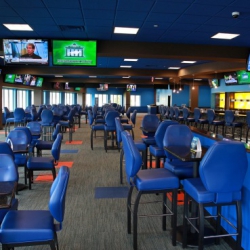The Las Vegas Sun believes sports gambling in New Jersey could dwarf the sportsbooks in Las Vegas. New Jersey’s proximity to the major metropolitan centers of New York City and Philadelphia set its gaming industry apart from Nevada’s. While casino gamblers might prefer the lavish casino-resorts of the Las Vegas Strip to the more blue class Atlantic City, sports betters often make one bet and leave the gaming locations.
In fact, Tim Dahlberg of the Associated Press focused on Monmouth Park in Oceanport, New Jersey for his story on the potential of New Jersey’s sportsbooks. Monmouth Park has several advantages that the Atlantic City casinos do not, which might make it a major destination for sports gamblers.
Monmouth Park Sportsbooks
Monmouth Park’s proximity to New York City is important. New York City is 50 miles away and, according to Mapquest, that translates to a 1-hour, 8-minute trip with traffic factored into the equation. Philadelphia is 85 miles away, making it a 1-hour, 38-minute trip. Betters would need to make wagers in person, but big money sports gamblers presumably could make a weekly visit to Monmouth Park from those cities to place a wager on their favorite games.
Monmouth Park also has a key partnership already: William Hill. William Hill is a leading sportsbook in the United Kingdom. It’s been around since the 1930s and has been listed on the London Stock Exchange since the 1950s.
William Hill and Sports Betting
The British bookmaker operates the William Hill Race and Sports Bar at the Monmouth Park complex. If and when sports gambling becomes legal in New Jersey, that same complex could become the William Hill Race and Sports Book. People from all over the northeast might gather to wager and watch games in such a venue. Under those circumstances, William Hill and Monmouth Park could become huge players in the emerging market.
A couple of weeks ago, it was learned that William Hill’s executives had advised Monmouth Park to use the interim between Governor Christie’s order and the actual opening of a sportsbook to train personnel. It was learned that William Hill estimated 110 new employees would be needed to collect wagers. Now, Joe Asher, head of operations for William Hill US, told the Associated Press, “We’re built out and ready to go. This is a very sizable market.”
New East Coast Bookmaker Market
Mr. Asher believes legal New Jersey sports gambling would open up a whole new market on the east coast. Such a market could eclipse the $3.6 billion in revenue Las Vegas sportsbooks collected in 2013. The executive believes gamblers from New York and New Jersey would flock to the bookmaking locations from day one.
Monmouth Park would not be the only beneficiary. Joe Asher says sports betting could save the remaining Atlantic City casinos. Since 2006, Atlantic City’s gambling industry has gone from $5.4 billion in revenues down to $2.86 in 2013. With 5 of the 12 casinos in the city closing by year’s end, the revenues should decline even more significantly. According to one source, New Jersey sports betting could involve up to $11 billion in revenues each year–about 3 times that of Las Vegas. The reason is the proximity to major population centers, such as New York City, Philadelphia, and Baltimore.
Coast-to-Coast Sports Gambling
Sportsbooks could turn around that trend, though. From 2006 to 2014, Atlantic City had no advantage to lure Pennsylvania gamblers away from Pennsylvanian casinos. New Yorkers had no real reason to flock to Atlantic City, like they did in the days before their own state had tribal casinos. Legal sports books would change all of that, because no such operations exist in New York or Pennsylvania.
Of course, lawmakers might eventually move to legalize sports betting in those states. That’s what the U.S. pro sports leagues fear when they sue the state of New Jersey over its new policies. While New Jersey sports betting would change how sports associations like the NFL, NBA, NHL, Major League Baseball, and NCAA operate, New Jersey would be opening the door to many other states doing the same thing. This case is a gateway to a 40-state legalized sports betting, ending the federal ban imposed by the 1992 PASPA law.

